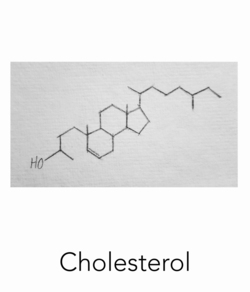Dyslipidemia
Dyslipidemia is the medical name for abnormal lipid quantities in the bloodstream - sometimes (although not precisely accurately) called high cholesterol. Strictly speaking, dyslipidemia is a disorder of metabolism related to lipoprotein. Although called a disorder, it is extremely common in modern society. Dyslipidemia is when the blood test indicates high total cholesterol, high LDL bad cholesterol, low HDL good cholesterol, or high levels of triglycerides. A broader definition could include elevated levels of other fatty materials or even too-low levels cholesterol and triglycerides, but as a practical matter, these rarely cause concern to doctors in the United States. It is TC, HDL, LDL, and triglycerides that people pay attention to.
 The lipid profile is done from a blood sample, and in particular the plasma portion of the blood. Plasma is the liquid part of the blood, without the red and white cells. You sometimes hear the number called plasma cholesterol or serum cholesterol.
The lipid profile is done from a blood sample, and in particular the plasma portion of the blood. Plasma is the liquid part of the blood, without the red and white cells. You sometimes hear the number called plasma cholesterol or serum cholesterol.
There are no firm numbers indicating dyslipidemia and indeed the guidelines for doctors have changed over the years, reflecting changing consensus of what counts as a problem. If treatment is subjectively deemed to be beneficial, the patient can be said to have dyslipidemia. Treatment options include changes in diet, changes in exercise routines, and medications. Statins are among the medications used to address dyslipidemia. Other drugs include fibrates, nicotinic acid, and bile acid sequestrants.
When you have your blood taken and a lipid profile done at the doctor's office, they usually measure total cholesterol (TC), high-density cholesterol (HDL), low-density cholesterol (LDL), and triglycerides.
Statins reduce triglyceride levels about 10% to 20%. The higher the triglyceride level, the bigger the percentage reduction. Statins tend to be highly effective in lowering TC and LDL but improvements in HDL levels are modest.
There are multiple potential causes of cardiovascular disease; dyslipidemia is one of the most significant.
What causes dyslipidemia?
Some people are just born with more cholesterol than others. There are also lifestyle/secondary causes, but the effect of these depends on genetics, too. Secondary causes can include drinking too much alcohol, diabetes, kidney disease, liver disease, not enough exercise, steroid drugs, and drugs for high blood pressure. Some feel diet matters, too, although others disagree.
A Note on Metabolic Syndrome
Metabolic syndrome a catch-all term used to describe a person with three or more of the following:
- high blood pressure – generally over 130/85 or so
- high blood sugar level - over 100 mg/dl when fasting
- obesity, especially with fat deposits around the abdomen, where men tend to accumulate fat - waist circumference above 40 inches for men, and 35 inches for women
- high triglyceride level in the blood – generally over 150 mg/dl
- low level of HDL (good cholesterol) – generally under 40 mg/dl for men and 50 mg/dl for women
It is estimated that 23 percent of American adults currently have metabolic syndrome.
Can the polypill address metabolic syndrome?
National Heart, Blood, and Lung Institute on metabolic syndrome


